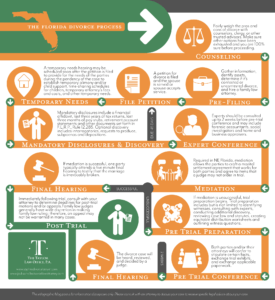Deciding whether or not to start the divorce process is usually a hard decision. To help people know what to expect throughout the process s I have created this infographic providing an overview of the Florida divorce process. For people who want to more in-depth information on the divorce process, please read the accompanying blog post below. If you have any questions about your specific situation you may contact me and set up your free consultation.
s I have created this infographic providing an overview of the Florida divorce process. For people who want to more in-depth information on the divorce process, please read the accompanying blog post below. If you have any questions about your specific situation you may contact me and set up your free consultation.
An Outline of the Florida Divorce Process
1. Should I file?
a. Do you really want a divorce? This is an important question with far reaching implications. Marriages usaully have ups and downs. People who work throughout marital problems often have stronger work satisfying marriages later in life.
i. Explore Counseling
ii. Consult with close friends who are good at being objective
iii. Consult with clergy or other spiritual advisors
iv. Fairly weigh the pro and cons of divorce
2. Pre-Filing Divorce Preparation
a. Meet with several family law attorneys. Ideally, you should meet with at least three family law attorneys. Since divorce is a personal process, it is important to work with attorneys with whom you relate well. Here are some questions to consider when meeting with a divorce attorney (by no means an exhaustive list):
i. How long have you been practicing law?
ii. Do you practice divorce and family law exclusively?
iii. What is your philosophy about the practice of law? Does the attorney identify as “aggressive” or settlement oriented?
iv. Have you handled cases with similar facts?
v. Do you anticipate the use of experts?
b. Gather Information and Identify Assets. A good starting point is to gather information required as part of Florida divorce mandatory disclosures: https://www.flcourts.org/core/fileparse.php/293/urlt/932.pdf
c. Determine if the case is going to be contested vs. uncontested. What is the likelihood you agree on issues related to time-sharing, parental responsibility, spousal support and the division of assets and liabilities?
d. Hire your family law attorney.
3. File Petition
a. File your petition
b. Serve spouse or spouse accepts service.
4. Temporary Needs Motions
a. Do you need temporary support, a temporary time-sharing schedule, assistance with attorney’s fees and costs, or exclusive use of the home? If so, you have the option of filing a motion for temporary needs to help meet your needs during the divorce process.
5. Mandatory Disclosures & Discovery
a. Mandatory disclosures are due 45 days from the date of service. Mandatory disclosures include but are not limited to financial affidavits, last three years of tax returns, pay stubs, banks statements, most recent retirement account statements, ect.
b. Standard Family Law Interrogatories. These interrogatories are approved by the Florida Supreme Court for family law and are a good starting point for information to obtain information relevant to the divorce process.
c. Request for Production of Documents (“RFP”). An RFP can be extremely broad asking for many years of financial documents and other relevant information or narrow asking for specific documents. Expansive RFP are common cases with aggressive attorneys or high net worth cases.
d. Notice of Production from Non-Party/Subpoena for Documents. Do need information from a non-party such as a spouse’s employer? You can issues a non-party subpoena. Prior to issuing a subpoena to a non-party, you must give at least ten (10) day notice with a copy the proposed non-party subpoena to all parties in the case. If there are no timely objections to the subpoena, your attorney or the clerk may issue subpoena. Subpoenas are commonly used to obtain employment and financial records.
e. Depositions. A deposition is process wherein an attorney or self-represented party asks the opposing party or witness questions under oath with a court reporter or videographer present. Depositions are extremely useful tools in complex cases, such as child custody/time-sharing disputes, or when facts are not clear and additional information is necessary. Depositions are expensive, so they are not used in every case.
6. Experts
a. Determine early on what experts are necessary to litigate your case.
b. Examples of experts: forensic accountants, social investigators , home appraisers, and business appraisers.
7. Mediation
a. In Northeast Florida, parties to a divorce are required to mediate prior to trial. Mediation typically occurs 3 to 9 months after the divorce petition is filed.
b. Prepare for mediation. Preparation for mediation is important. Meet with your attorney to develop a proposed equitable distribution worksheet, child support worksheets and a proposed parenting plan (if applicable) prior to mediation.
c. Mediation allows the parties to craft a martial settlement agreement that works for both parties and agree to items that a judge may not order at trial.
8. Final Hearing
a. If mediation is successful, one party typically attends a (5) minute final hearing to testify that the marriage is irretrievably broken and at the least spouse resided in Florida at least six months prior to filing the divorce petition.
b. If mediation is not successful, a trial will occur usually nine months to one year after the case is filed. The parties or their attorneys will also attend a pre-trial conference about two weeks prior to the trial to stipulate to certain facts, exchange trial exhibits, proposed equitable distribution worksheets, child support worksheet and proposed parenting plans (if applicable).
9. Post-Trial
a. Immediately following trial consult with your attorney to determine deadlines for post-trial motions and/or appeals.
b. Determine if any post-trial motions, such motion for rehearing, are warranted.
c. Consult with attorney and appellate counsel to determine if the trial court judge made any reversible errors. Family law judges generally have wide discretion in making family law rulings; therefore, an appeal may not be warranted in many cases.
I hope this has helped you to get a better idea of what to expect during the Florida divorce process. The divorce process is different for every couple, so make sure you have a qualified family law lawyer to help you through the divorce process.
This infographic and blog post is for information purposes only. Please consult with an attorney to discuss your case to receive specific legal advice about your case.
